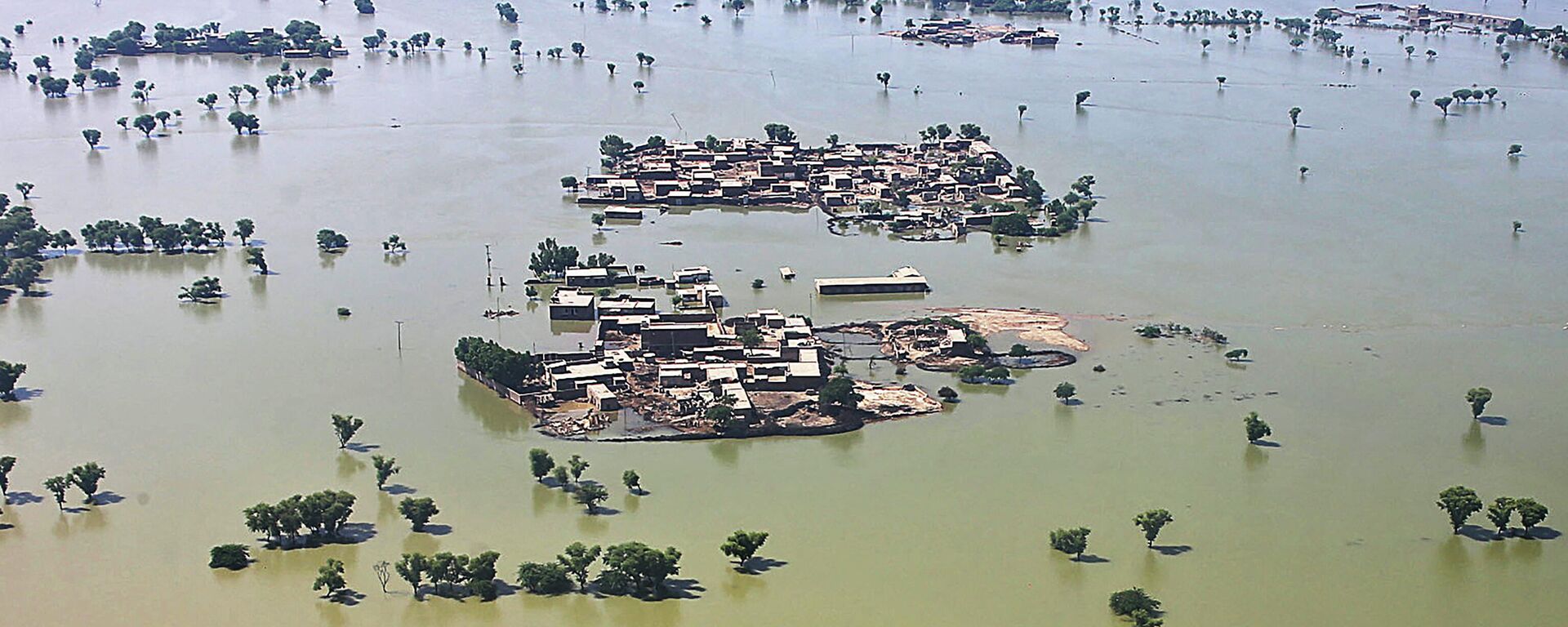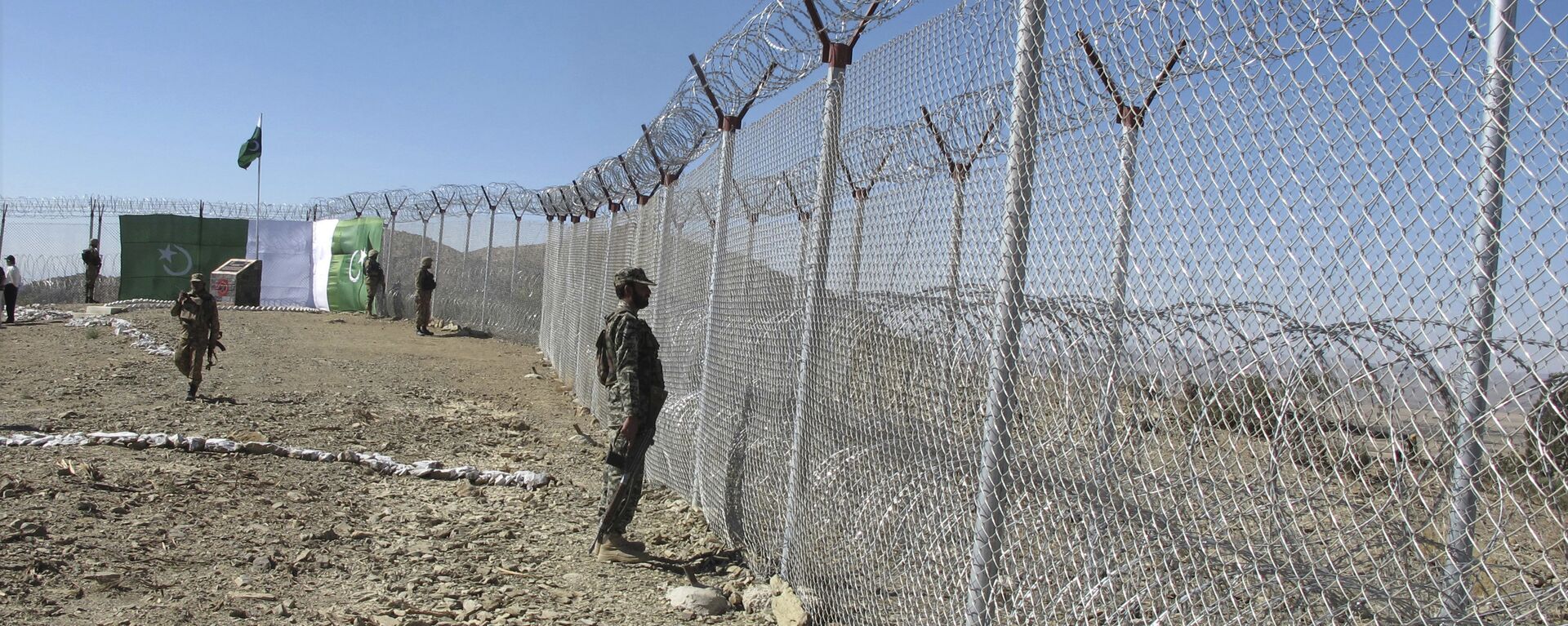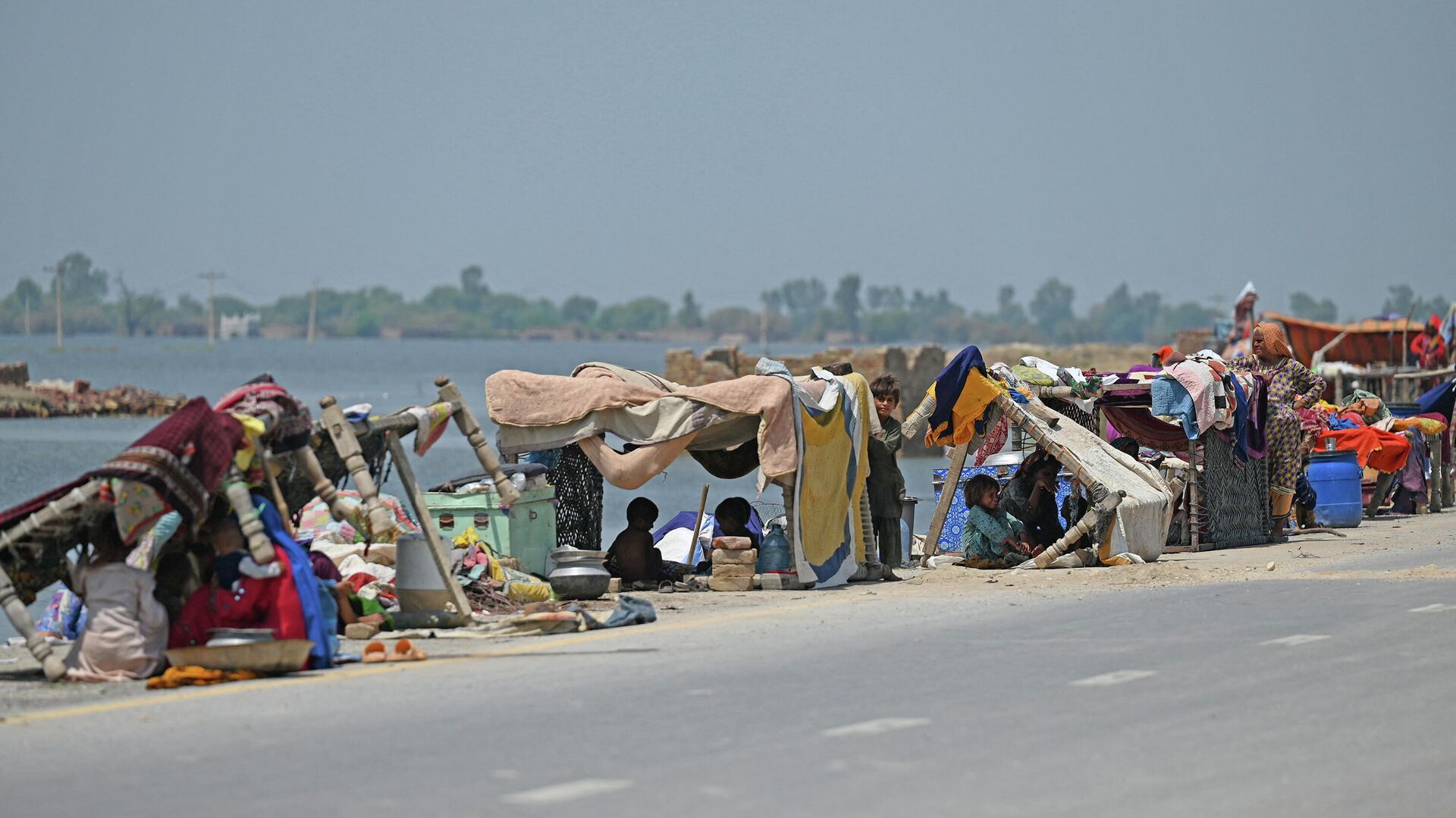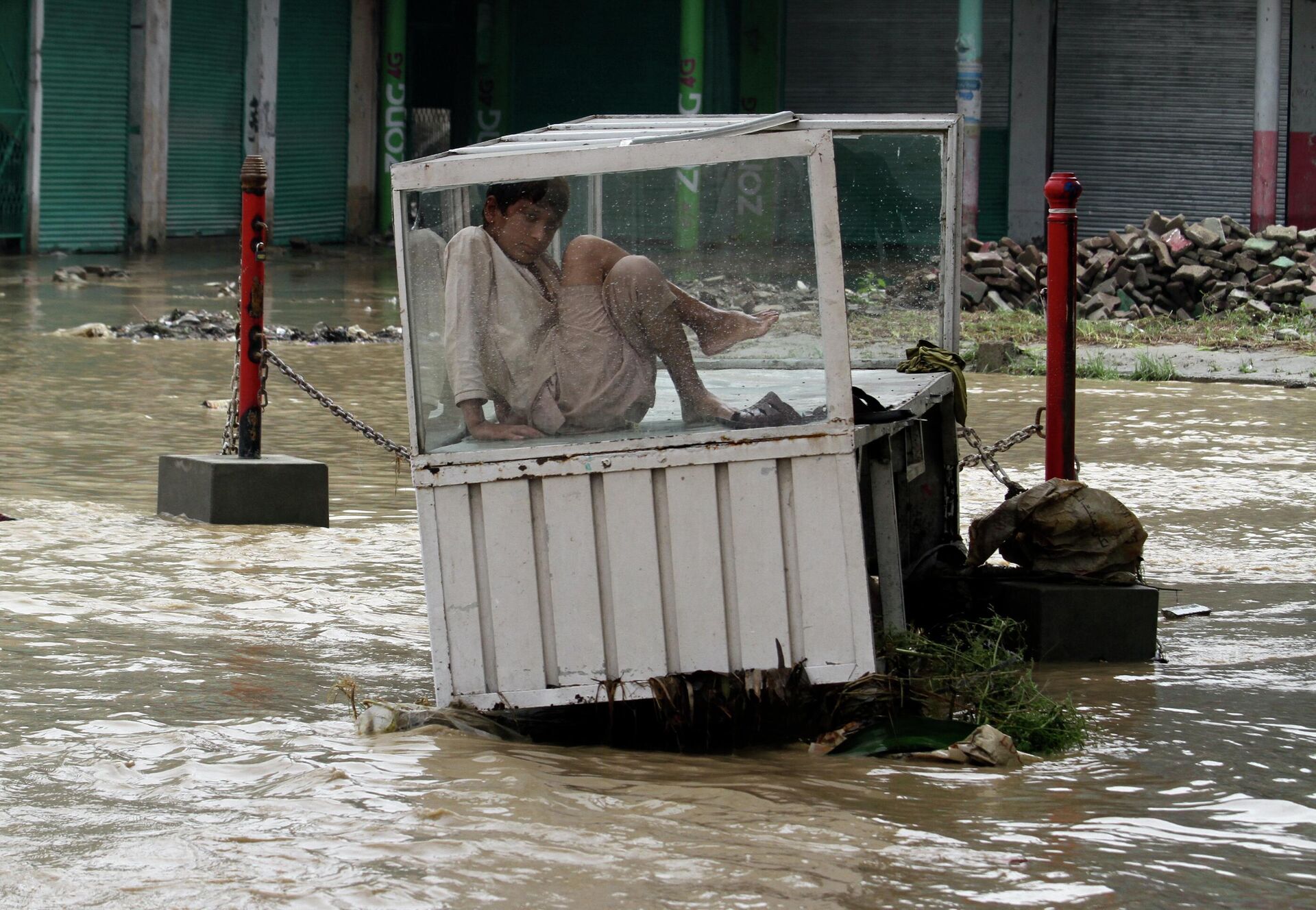https://sputnikglobe.com/20220906/flood-disaster-rising-inflation--political-turmoil-puts-pakistans-ruling-elite-under-scrutiny-1100453360.html
Flood Disaster, Rising Inflation, & Political Turmoil Puts Pakistan's Ruling Elite Under Scrutiny
Flood Disaster, Rising Inflation, & Political Turmoil Puts Pakistan's Ruling Elite Under Scrutiny
Sputnik International
Pakistani authorities have declared a state of emergency in the country, calling on all international organizations to help with flood relief. However, it... 06.09.2022, Sputnik International
2022-09-06T15:28+0000
2022-09-06T15:28+0000
2022-10-19T18:49+0000
world
pakistan
floods
asia
https://cdn1.img.sputnikglobe.com/img/07e6/09/06/1100453166_0:153:2978:1828_1920x0_80_0_0_e780afaaf8bd3843d9d4cd43dde49202.jpg
Pakistan’s National Disaster Management Authority (NDMA) said on Monday that as a result of the monsoon rains and floods, ravaging the country since June, nearly a million homes had been completely or partially destroyed, over 800,000 livestock killed, and 2,200 miles of roads and 157 bridges damaged. GDP growth is expected to be reduced from the previously predicted 5% to only 2% in the current fiscal year, the broadcaster added.Amid this tragic scenario, political instability is adding fuel to the fire. Recently, former Prime Minister Imran Khan in a public rally in Faisalabad called out the current government of Shehbaz Sharif, saying that it was delaying the elections in order to appoint an army chief of its own and that if a "patriotic chief of army staff comes in, he will not spare the incumbent rulers."The current chief-of-army-staff (COAS), Gen. Qamar Javed Bajwa, who was appointed in 2016, is set to retire in the last week of November.Imran Khan, who wants to be reinstated as the prime minister, wants the elections to take place before the appointment of army chief is made. Khan claims he was ousted under a US plot, a charge that Washington denies.Since his exit, he has stepped up his campaign to remove the current government through "pressure from the people." Khan wants Sharif to agree to snap elections, a demand which Sharif has rejected.Khan's recent statement about the army chief made quite a stir amongst the ruling elite and the military.The response further said that the procedure for appointment of a new army chief is well defined in the constitution and is always made on merit.Following the ISPR's statement, Fawad Chaudhry, the vice president of Imran Khan's political party the PTI, attempted to explain and defend Khan’s remarks, saying that what the former prime minister meant was that the decision to appoint the next chief-of-army-staff (COAS) could not be left to the current government since it lacked "political legitimacy.""We have raised questions on the legitimacy of the politicians who are making decisions," Chaudhry said. He added that the PTI felt the army should not be involved in the political process.This back and forth political bickering and allegations come at a crucial time for the country.Torrential monsoon rainfall has caused the Swat and Indus rivers to overflow, submerging land tens of kilometers wide, according to recent images from the European Space Agency.The massive floods across Pakistan have particularly hit provinces that were already facing economic challenges. The tragedy in the provinces of southern Punjab, NWFP, Sindh, and Balochistan is unprecedented.Crops and livestock have been lost, having a huge impact on both the livelihood and nutrition of the afflicted communities. Although climatic disasters are natural and can happen in any country, bad policy developments and poor city planning results in lasting disastrous effects.More than 33 million people have been directly impacted by the floods, which is about 15% of the total population. Over six million people are in dire need of humanitarian aid as soon as possible.UNICEF’s Representative in Pakistan, Abdullah Fadil, said that over 1.1 million houses have been washed away and vital infrastructure, such as hospitals and schools, has been destroyed.Furthermore, the representative said that diseases such as diarrhea, cholera, malaria, dengue, and even polio are affecting the flood victims and their children.The grim predictions are further mired by the fact that the monsoon rains continue and more flooding is going to take place in the coming days, so there is an urgent need to drastically increase disease surveillance, fix damaged health facilities, and ensure adequate medicines and health supplies to the affected communities.Pakistan urgently needs food, medicines, drinking water, tents, and mosquito nets.Two questions arise: What is the government doing to help the flood victims and which countries are going to support Pakistan in this ordeal?Pakistan's Foreign Minister Bilawal Bhutto-Zardari has appealed to the international community, saying that, "Going forward, I would expect not only the International Monetary Fund, but the international community and international agencies to truly grasp the level of devastation. I haven’t seen destruction of this scale, I find it very difficult to put into words ... It is overwhelming. Many crops that provided much of the population’s livelihoods had been wiped out," he said.The foreign minister said that he hoped the flooding emergency would convince the IMF’s board to release $1.2bn as part of the seventh and eighth tranches of Pakistan’s bailout program.Meanwhile, the government has deployed soldiers to help civilian authorities in rescue and relief operations across the country. With the two UNHCR planes, 38 planes have brought in aid from countries including China, Qatar, the United Arab Emirates, and Uzbekistan.Russia, the world's largest wheat exporter, is in talks with Pakistan to supply it with the grain to help feed the population.Meanwhile, the US Embassy in Islamabad has said that it will allocate $30 million for flood relief, despite Pakistan's repeated claims that it needs $1 billion at least.Just $30 million for a country that aided the US in its "War on Terror" seems like quite an unfair bargain.Pakistan has given shelter to almost two million Afghan refugees over the past decade, after they fled their own homeland due to the US war. These refugees were provided with proof of identity, entitlement to temporary stay in Pakistan, and freedom of movement. They were given access to certain essential services, including education, healthcare, banking, property rental, and facilities.After US-led foreign troops chaotically withdrew from the county last year, it resulted in hundreds of thousands of Afghans fleeing for fear of Taliban* reprisals.Pakistani officials report more than 300,000 Afghans have entered Pakistan since the Taliban takeover in 2021. Around 100,000 of them arrived on valid visas, while the rest crossed the border illegally.All that costs Pakistan a tremendous amount of money and now might be a good time for the West, that has caused war and devastation in the region to help their "friend in need" with proper funding and serious humanitarian relief.*The Taliban is under UN sanctions for terrorist activities.
https://sputnikglobe.com/20220903/devastating-floods-in-pakistan-could-worsen-food-security-in-afghanistan-warns-un-1100333013.html
https://sputnikglobe.com/20211021/afghan-pakistan-border-equally-unstable-as-loc-will-come--bite-them-warns-indian-army-chief-1090107472.html
pakistan
Sputnik International
feedback@sputniknews.com
+74956456601
MIA „Rosiya Segodnya“
2022
Aneela Rashid
https://cdn1.img.sputnikglobe.com/img/07e6/09/0e/1100768477_0:338:606:944_100x100_80_0_0_af078d1bbaf1e33c21f16169e9ed7a5f.jpg
Aneela Rashid
https://cdn1.img.sputnikglobe.com/img/07e6/09/0e/1100768477_0:338:606:944_100x100_80_0_0_af078d1bbaf1e33c21f16169e9ed7a5f.jpg
News
en_EN
Sputnik International
feedback@sputniknews.com
+74956456601
MIA „Rosiya Segodnya“
Sputnik International
feedback@sputniknews.com
+74956456601
MIA „Rosiya Segodnya“
Aneela Rashid
https://cdn1.img.sputnikglobe.com/img/07e6/09/0e/1100768477_0:338:606:944_100x100_80_0_0_af078d1bbaf1e33c21f16169e9ed7a5f.jpg
pakistan, floods
Flood Disaster, Rising Inflation, & Political Turmoil Puts Pakistan's Ruling Elite Under Scrutiny
15:28 GMT 06.09.2022 (Updated: 18:49 GMT 19.10.2022) Pakistani authorities have declared a state of emergency in the country, calling on all international organizations to help with flood relief. However, it appears that as this human catastrophe unfolds, Pakistani politicians are keeping busy by bickering with each other as their power struggle continues.
Pakistan’s National Disaster Management Authority (NDMA) said on Monday that as a result of the monsoon rains and
floods, ravaging the country since June, nearly a million homes had been completely or partially destroyed, over 800,000 livestock killed, and 2,200 miles of roads and 157 bridges damaged. GDP growth is expected to be reduced from the previously predicted 5% to only 2% in the current fiscal year, the broadcaster added.
Amid this tragic scenario, political instability is adding fuel to the fire. Recently, former Prime Minister Imran Khan in a public rally in Faisalabad called out the current government of Shehbaz Sharif, saying that it was delaying the elections in order to appoint an army chief of its own and that if a "patriotic chief of army staff comes in, he will not spare the incumbent rulers."
The current chief-of-army-staff (COAS), Gen. Qamar Javed Bajwa, who was appointed in 2016, is set to retire in the last week of November.
Imran Khan, who wants to be reinstated as the prime minister, wants the elections to take place before the appointment of army chief is made. Khan claims he was ousted under a US plot, a charge that Washington denies.
Since his exit, he has stepped up his campaign to remove the current government through "pressure from the people." Khan wants Sharif to agree to snap elections, a demand which Sharif has rejected.
Khan's recent statement about the army chief made quite a stir amongst the ruling elite and the military.
In response to his statement, the Inter-Services Public Relations (ISPR) released a response, stating that, "Regrettably, an attempt has been made to discredit and undermine [the] senior leadership of [the] Pakistan Army at a time when the institution is laying lives for the security and safety of the people of Pakistan every day."
The response further said that the procedure for appointment of a new army chief is well defined in the constitution and is always made on merit.

3 September 2022, 07:27 GMT
Following the ISPR's statement, Fawad Chaudhry, the vice president of Imran Khan's political party the PTI, attempted to explain and defend Khan’s remarks, saying that what the former prime minister meant was that the decision to appoint the next chief-of-army-staff (COAS) could not be left to the current government since it lacked "political legitimacy."
"We have raised questions on the legitimacy of the politicians who are making decisions," Chaudhry said. He added that the PTI felt the army should not be involved in the political process.
"There is no doubt about the patriotism of the army's leadership. There can be no doubt or suspicion about it," Chaudhry stressed further.
This back and forth political bickering and allegations come at a crucial time for the country.
Torrential monsoon rainfall has caused the Swat and Indus rivers to overflow, submerging land tens of kilometers wide, according to recent images from the European Space Agency.
The massive floods across Pakistan have particularly hit provinces that were already facing economic challenges. The tragedy in the provinces of southern Punjab, NWFP, Sindh, and Balochistan is unprecedented.
Crops and livestock have been lost, having a huge impact on both the livelihood and nutrition of the afflicted communities. Although climatic disasters are natural and can happen in any country, bad policy developments and poor city planning results in lasting disastrous effects.
More than 33 million people have been directly impacted by the floods, which is about 15% of the total population. Over six million people are in dire need of humanitarian aid as soon as possible.
UNICEF’s Representative in Pakistan, Abdullah Fadil, said that over 1.1 million houses have been washed away and vital infrastructure, such as hospitals and schools, has been destroyed.
Furthermore, the representative said that diseases such as diarrhea, cholera, malaria, dengue, and even polio are affecting the flood victims and their children.
The grim predictions are further mired by the fact that the monsoon rains continue and more flooding is going to take place in the coming days, so there is an urgent need to drastically increase disease surveillance, fix damaged health facilities, and ensure adequate medicines and health supplies to the affected communities.
Pakistan urgently needs food, medicines, drinking water, tents, and mosquito nets.
Two questions arise: What is the government doing to help the flood victims and which countries are going to support Pakistan in this ordeal?
Pakistan's Foreign Minister Bilawal Bhutto-Zardari has appealed to the international community, saying that, "Going forward, I would expect not only the International Monetary Fund, but the international community and international agencies to truly grasp the level of devastation. I haven’t seen destruction of this scale, I find it very difficult to put into words ... It is overwhelming. Many crops that provided much of the population’s livelihoods had been wiped out," he said.
The foreign minister said that he hoped the flooding emergency would convince the IMF’s board to release $1.2bn as part of the seventh and eighth tranches of Pakistan’s bailout program.
Meanwhile, the government has deployed soldiers to help civilian authorities in rescue and relief operations across the country. With the two UNHCR planes, 38 planes have brought in aid from countries including China, Qatar, the United Arab Emirates, and Uzbekistan.
Russia, the world's largest wheat exporter, is in talks with Pakistan to supply it with the grain to help feed the population.
Meanwhile, the US Embassy in Islamabad has said that it will allocate $30 million for flood relief, despite Pakistan's repeated claims that it needs $1 billion at least.
Just $30 million for a country that aided the US in its "War on Terror" seems like quite an unfair bargain.
Pakistan has given shelter to almost two million Afghan refugees over the past decade, after they fled their own homeland due to the US war. These refugees were provided with proof of identity, entitlement to temporary stay in Pakistan, and freedom of movement. They were given access to certain essential services, including education, healthcare, banking, property rental, and facilities.

21 October 2021, 18:48 GMT
After US-led foreign troops chaotically withdrew from the county last year, it resulted in hundreds of thousands of Afghans fleeing for fear of Taliban* reprisals.
Pakistani officials report more than 300,000 Afghans have entered Pakistan since the Taliban takeover in 2021. Around 100,000 of them arrived on valid visas, while the rest crossed the border illegally.
All that costs Pakistan a tremendous amount of money and now might be a good time for the West, that has caused war and devastation in the region to help their "friend in need" with proper funding and serious humanitarian relief.
*The Taliban is under UN sanctions for terrorist activities.








